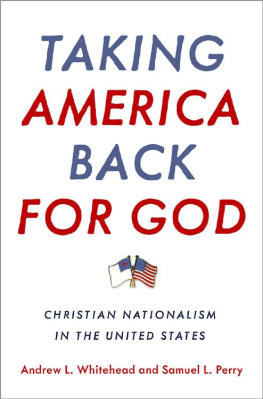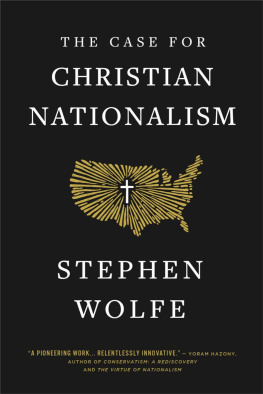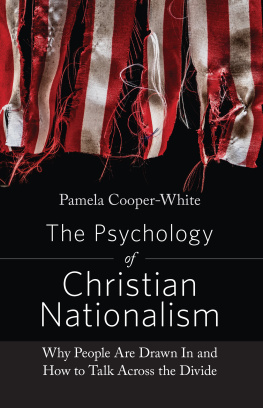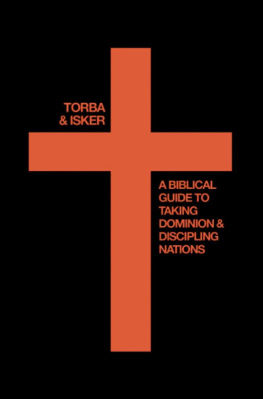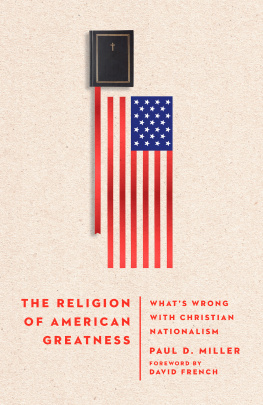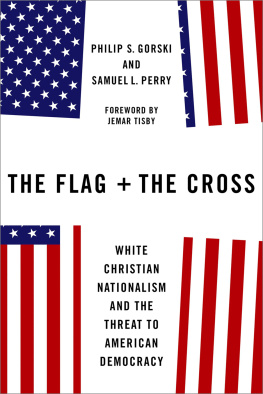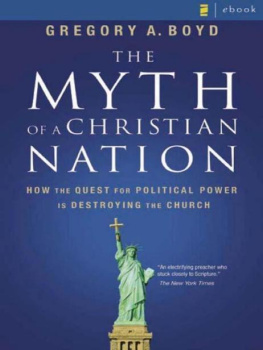TAKING AMERICA BACK FOR GOD
TAKING AMERICA BACK FOR GOD
Christian Nationalism in the United States
andrew l. whitehead
and
samuel l. perry


Oxford University Press is a department of the University of Oxford. It furthers the Universitys objective of excellence in research, scholarship, and education by publishing worldwide. Oxford is a registered trade mark of Oxford University Press in the UK and certain other countries.
Published in the United States of America by Oxford University Press
198 Madison Avenue, New York, NY 10016, United States of America.
Oxford University Press 2020
All rights reserved. No part of this publication may be reproduced, stored in a retrieval system, or transmitted, in any form or by any means, without the prior permission in writing of Oxford University Press, or as expressly permitted by law, by license, or under terms agreed with the appropriate reproduction rights organization. Inquiries concerning reproduction outside the scope of the above should be sent to the Rights Department, Oxford University Press, at the address above.
You must not circulate this work in any other form and you must impose this same condition on any acquirer.
Library of Congress Cataloging-in-Publication Data
Names: Whitehead, Andrew L., author. | Perry, Samuel L., author.
Title: Taking America back for God : Christian nationalism in the United States /
Andrew L. Whitehead, Samuel L. Perry.
Description: New York, NY, United States of America. :
Oxford University Press, 2020. | Includes bibliographical references. |
Identifiers: LCCN 2019031330 (print) | LCCN 2019031331 (ebook) |
ISBN 9780190057886 (hardback) | ISBN 9780190057909 (epub) |
ISBN 9780190057893 (updf) | ISBN 9780190057916 (online)
Subjects: LCSH: Christianity and politicsUnited StatesHistory21st century. |
NationalismReligious aspectsChristianityHistory20th century. |
NationalismUnited StatesHistory20th century. |
Christianity and cultureUnited StatesHistory21st century. |
ChristianityInfluence.
Classification: LCC BR516 .W438 2020 (print) | LCC BR516 (ebook) |
DDC 261.70973dc23
LC record available at https://lccn.loc.gov/2019031330
LC ebook record available at https://lccn.loc.gov/2019031331
To Kelly,
You know I would.
~ Andrew
To Ryan, Beau, and Whitman,
You are the reason we need to get this right.
~ Sam
In the imagination of the simple patriot the nation is not a society but Society. Though its values are relative they appear, from his nave perspective, to be absolute.... The nation is always endowed with an aura of the sacred, which is one reason why religions, which claim universality, are so easily captured and tamed by national sentiment, religion and patriotism merging in the process.
Reinhold Niebuhr, Moral Man and Immoral Society, 1936:9697
See to it that no one takes you captive through hollow and deceptive philosophy, which depends on human tradition and the basic principles of this world rather than on Christ.
Colossians 2:8 (NIV)
Contents
Most Americans who watch the news or scroll through social media could quickly list the most salient cultural and political issues currently driving a wedge down the middle of the United States: immigration reform, mass shootings, climate change, military spending, terrorism, gun control, travel bans, refugees, political correctness, opioid addiction, public education, racial injustice in policing, redefinitions of marriage and the family, secularism, transgender rights, single-parent households, and, of course, Donald Trump.
It doesnt take a social scientist to identify the sticking points in our country. The more contentious debate, rather, is over what connects those dots. What has us so increasingly and uniformly divided on those issues? Ask ten social scientists to explain that to you, and you may get ten different theories. There arent any simple answers to that question, unfortunately. There are a myriad of historical, demographic, economic, and technological factors contributing to our increasing polarization on issues of race, family, religion, gender, human rights, the environment, taxes, and so on. There is no silver-bullet explanation, and we dont intend to offer one here. Our goal in this book is to thoroughly explore one factor that, as we will show, plays a large, unique, but often unrecognized (and at times, misrecognized) role in our nations current cultural and political conflicts. That factor is Christian nationalism.
Some conceptual clarifications would be helpful at the onset. Though journalists and historians have bandied about the term a good deal in the past decade, we mean Christian nationalism to describe an ideology that idealizes and advocates a fusion of American civic life with a particular type of Christian identity and culture. We use Christian here in a specific sense. We are not referring to doctrinal orthodoxy or personal piety. (In fact, we find some Christian nationalists can be quite secular.) Rather, the explicit ideological content of Christian nationalism comprises beliefs about historical identity, cultural preeminence, and political influence. But just as important, it also contains ideological content that is often implicit. This includes symbolic boundaries that conceptually blur and conflate religious identity (Christian, preferably Protestant) with race (white), nativity (born in the United States), citizenship (American), and political ideology (social and fiscal conservative). Christian nationalism, then, provides a complex of explicit and implicit ideals, values, and mythswhat we call a cultural frameworkthrough which Americans perceive and navigate their social world.
What do we not mean by Christian nationalism? Firstand this may surprise (or disappoint) some readersthis isnt a book about white evangelicals. Certainly, we will address the considerable overlap between Christian nationalism and white evangelicalism. But the two concepts are not at all synonymous. Christian nationalism is a framework that orients Americans perspectives on national identity, belonging, and social hierarchies. American evangelicalism, strictly speaking, is a theological tradition prioritizing certain doctrinal commitments including biblical inerrancy and conversionism. While a large percentage of Christian nationalists are affiliated with evangelical Protestant denominations and hold characteristically evangelical beliefs, many non-evangelicals (or non-Christians, for that matter) also hold strong Christian nationalist beliefs. Conversely, many white evangelicals in surveys unequivocally reject Christian nationalism, including a number of the white evangelicals we interviewed for this book.
Second, occasionally people have been confused by the term nationalism, which we do not strictly mean in the chauvinistic sense of blindly believing that ones nation is superior to others. Though strong Christian nationalists would no doubt hold that sentiment about America (Christian nationalists do tend to be more nationalistic), we mean something more like Christian nation-ism or what
We also want to distinguish Christian nationalism from theocracy as people commonly think of that term. (Reformed camps of evangelicals debate different philosophies of churchstate relations using terms like

